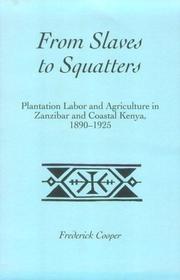| Listing 1 - 3 of 3 |
Sort by
|
Book
ISSN: 00685046 ISBN: 9782713227103 2713227100 Year: 2017 Volume: 42 Publisher: Paris : Éditions EHESS,
Abstract | Keywords | Export | Availability | Bookmark
 Loading...
Loading...Choose an application
- Reference Manager
- EndNote
- RefWorks (Direct export to RefWorks)
Les hindouismes hors de l’Inde posent un défi à l’observateur : comment cette religion perçue comme consubstantielle au territoire indien peut-elle s’exporter, s’adapter et s’enraciner loin de sa « terre-Mère » ? L’expérience particulière de l’île Maurice, une société créole dont la majorité de la population se reconnaît comme hindoue, offre un cas d’étude idéal pour une analyse historiquement contextualisée d’un "hindouisme créole"
Hinduism --- Plantation workers --- East Indians --- Group identity --- History. --- Religious life --- Social life and customs. --- Mauritius --- Religious life and customs. --- Civilization --- Indic influences. --- Hindouisme --- Travailleurs des plantations --- Indiens (Habitants de l'Inde) --- Identité collective --- Vie religieuse --- Moeurs et coutumes

ISBN: 9780435074203 0435074202 Year: 1997 Publisher: Portsmouth Heinemann
Abstract | Keywords | Export | Availability | Bookmark
 Loading...
Loading...Choose an application
- Reference Manager
- EndNote
- RefWorks (Direct export to RefWorks)
Plantation workers --- Agriculture --- Slavery --- Travailleurs des plantations --- Esclavage --- History --- Histoire --- History. --- Agricultural laborers --- Farming --- Husbandry --- Industrial arts --- Life sciences --- Food supply --- Land use, Rural --- Abolition of slavery --- Antislavery --- Enslavement --- Mui tsai --- Ownership of slaves --- Servitude --- Slave keeping --- Slave system --- Slaveholding --- Thralldom --- Crimes against humanity --- Serfdom --- Slaveholders --- Slaves --- Enslaved persons
Multi
ISBN: 9781478018247 9781478015611 9781478022855 1478018240 1478015616 Year: 2022 Publisher: Durham [North Carolina] Duke University Press
Abstract | Keywords | Export | Availability | Bookmark
 Loading...
Loading...Choose an application
- Reference Manager
- EndNote
- RefWorks (Direct export to RefWorks)
"Drawing on long-term ethnographic fieldwork and prior human rights advocacy in the Indonesian-controlled region of West Papua, In the Shadow of the Palms explores how deforestation and monocrop oil palm expansion reconfigure the multispecies lifeworld of Indigenous Marind communities through its effects on the landscape, time, personhood, and dreams. Working with and across species categories and hierarchies, the book highlights how the proliferation of industrial monocrops subverts the futures and relations of some lifeforms while opening new horizons of possibility for others. Sophie Chao situates these dynamics within West Papua's violent and volatile history of political colonization, ethnic domination, and capitalist incursion. By approaching cash crops as both drivers of destruction and subjects of human exploitation, the book makes a compelling argument for rethinking capitalist violence as a multispecies act. Taking oil palm as its central protagonist, it makes a timely contribution to our understanding of human-environment relations in an age of radical ecological change"--
Palm oil industry --- Plantation workers --- Sustainable development --- Rural development --- Deforestation --- SOCIAL SCIENCE / Anthropology / Cultural & Social --- SCIENCE / Environmental Science (see also Chemistry / Environmental) --- Social aspects --- Environmental aspects --- Social conditions. --- Social conditions --- Deforestation. --- Déboisement --- Développement durable --- Développement rural --- Entwaldung. --- Huile de palme --- Indonesien. --- Ländliche Entwicklung. --- Palm oil industry. --- Palmöl. --- Palmölindustrie. --- Rural development. --- SCIENCE / Environmental Science (see also Chemistry / Environmental). --- SOCIAL SCIENCE / Anthropology / Cultural & Social. --- Soziale Lage. --- Sustainable development. --- Travailleurs des plantations --- Umweltbelastung. --- Industrie --- Aspect de l'environnement --- Aspect social --- Social aspects. --- Conditions sociales --- Indonesia --- Provinz Papua. --- Human ecology. Social biology --- Environmental protection. Environmental technology --- ecology --- environmental protection --- pollution
| Listing 1 - 3 of 3 |
Sort by
|

 Search
Search Feedback
Feedback About UniCat
About UniCat  Help
Help News
News